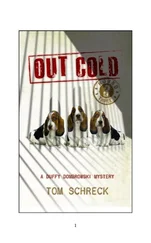Our longhouse was the most westerly of the three, and only occasionally did someone venture outside and walk through the thick snow to visit our immediate neighbours. For two months no one at all from our longhouse went as far as the second of the Icelandic houses, and when someone did — it was Thorvard, Freydis's husband - he found the door was banked up with snow as if no one had emerged for days. When he levered open the door and went inside, he found the place was a mortuary. A third of the people were dead of cold and hunger, and the survivors looked no more than bundles of rags, scarcely able to raise themselves from where they lay on the side benches.
There was more bad news when one of our own men came back from the beach, where we had stored the two knorrs for the winter. At the time of the first, unexpected snow we had dragged the two vessels on rollers up above the high-tide line, propped them up on wooden baulks, and heaped banks of shingle around them as a protection from the blizzards. Then we covered them with tents of wadmal. But a winter gale had stripped away the covers from the elderly vessel that Leif had loaned us, and snow had filled her. A false spring day with its sudden thaw had melted the snow to water, which filled the bilge. That same evening a sudden drop in temperature turned the water into ice, which expanded and split the garboard plank, the key plank which ran the length of her keel. When our carpenter tried to mend the long and dangerous crack he found that the bottom of our ship was entirely rotten. Every time he tried to replace a section of plank, the adjacent area of hull crumbled away. The carpenter was a grouchy and bad-tempered man at the best of times, and now he reported to Thorvard that he refused to waste his time trying to make the decayed old vessel seaworthy.
By that stage, I think, Freydis had already made up her mind that the colony was a failure and that we would have to evacuate Leif s cabins yet again. But she kept the idea to herself and, with typical guile, prepared for the evacuation without alerting anyone else. Her immediate problem was the damage to our knorr. We needed a vessel to carry us away from Vinland and our ancient and rickety knorr was no longer seaworthy. One possible solution was for all the settlers, both Icelanders and Greenlanders, to evacuate the colony by cramming aboard the Icelanders' large, newer vessel. But given the history of bad blood between the two groups it was very unlikely that the Icelanders would agree to this arrangement. Alternatively the Icelanders might lend us their vessel for the evacuation if we promised to send the ship back to them once we had safely arrived in Greenland. Though why the Icelanders should trust us to do this was an open question. And even if the Icelanders were so generous, Freydis knew that there was a more acute problem to confront: if the Icelanders stayed behind in Vinland and somehow managed to make a success of the venture, then by customary law the possession and ownership of the entire settlement would pass away from the Erikssons and transfer to Helgi and Finnbogi and their heirs. They would no longer be Leif s cabins, but Helgi and Finnbogi's cabins, and this was a humiliation which Freydis, the daughter of Erik the Red, could not bear.
Her solution to the dilemma was as artful as it was demonic. It depended on that fatal Norse belief in personal honour.
Very soon after the spring thaw, a real one this time, she walked over to visit the nearest Icelandic longhouse. It was early in the morning, at first light, and I saw her go because I had slipped out of the longhouse to get some badly needed fresh air after a fetid night spent among the snoring Greenlanders. I was loitering near one of the empty store sheds. I always tried to stay well clear of Freydis, so when I saw her I stepped behind the shed until she walked past. I watched her push open the door of the Icelanders' longhouse and go inside. When she reappeared she was accompanied by Finnbogi, who was wearing a heavy coat to keep out the cold. The two were intending to walk in my direction, and once again I shrank back from view. They halted, less than ten paces away, and I heard Freydis say, 'I've had enough of Vinland. I've made up my mind that my people should leave the colony and return home. For that I need to buy your knorr because our vessel is no longer fit for the journey to Greenland. We'll sail away from here, and if you, Helgi and your people want to stay on, then the settlement is yours.'
Finnbogi must have been taken by surprise, for there was a long pause and then he answered that he had no objection to her proposal but would first have to check it with his brother. I heard the soft crunch of his footsteps receding on the slushy snow as he returned to the Icelanders' house. I waited to give Freydis time to get back to our own longhouse, and then scuttled there as fast as I could, knowing instinctively that something was very wrong. It was not my second sight which warned me. It was my long experience of Freydis. Speaking to Finnbogi, her voice had carried that hint of treachery and manipulation that had preceded the unpleasant tricks she had inflicted on me back in Brattahlid in my father's house. That tone of deceit convinced me that Freydis was planning something unpleasant. Quite how foul her plan was soon became apparent.
I got into the longhouse just in time to hear Freydis deliberately provoke her weak-willed husband Thorvard into losing his temper. That was another of Freydis's techniques I recognised. Thorvard must still have been in bed when Freydis returned to the longhouse and climbed in beside him, for he kept repeating his question. 'Where have you been? Where have you been? You have got cold, wet feet, and the hem of your shift is damp, so you must have been outside.' At first Freydis refused to answer. Then finally, when Thorvard was truly irritated with her grudging silence, she said that she had been to see Finnbogi and his brother to ask them for the sale or loan of their knorr.
'They refused my request outright,' she said. 'They laughed in my face, and then insulted me. They said I was becoming more like a man every day, and that you, not I, should have come to discuss the matter with them. Finnbogi even went so far as to hit me, knocking me to the ground.'
Thorvard began to bluster. He had a good mind to go out and give the brothers a good thrashing, he said. Freydis pounced on his bravado. 'If you were more than half a man,' she retorted scathingly, 'you would do more than just lie in bed threatening the two ruffians who have humiliated me. A real man would go off and avenge my honour. But you, you little worm, you are such a coward that you will do nothing. I know you and your fainthearted ways, and so too do half the people in Brattahlid. When we get home, I'm going to divorce you on the grounds of cowardice, and there's no one who would not sympathise with me.'
As usual, my aunt knew how to twist the knife. Cowardice is almost the worst and most shameful ground for summary divorce in Norse society, exceeded only by homosexual acts. Her goading was more than Thorvard could bear. He leapt out of bed, threw on his clothes and grabbed an axe and a sword. Moments later, with Freydis at his heels and calling on the other Greenlanders to follow their leader, Thorvard was slipping and slithering along the muddy path to the Icelanders' longhouse. He slammed his way into the building, ran across to where Helgi was sitting on his bed, sleepily thinking over Freydis's proposal to buy the knorr, and with a great swipe he sank his axe into Helgi's chest, killing him. Within moments a massacre was in progress. More and more of the Greenlanders appeared, brandishing their weapons and hacking and stabbing at the unfortunate Icelanders, who were taken by surprise. There were curses and shouts as the Icelanders rolled off their sleeping benches and scrabbled to find their weapons and defend themselves. But they were at too much of a disadvantage. Most of them were killed while they were sleepy or unarmed.
Читать дальше








